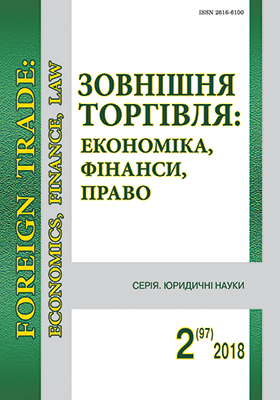THE FORMATION OF CIVIL SOCIETY IN UKRAINE
Keywords:
civil society, civil society institutions, public authorities, civic organizations, democratic process, social activity of citizensAbstract
Background. In the constitutional acts of Ukraine: the Declaration on State Sovereignty of July 16, 1990, the Act of Independence of August 24, 1991 and the Constitution of Ukraine of June 28, 1991, laid the foundations for the formation of civil society in our state. Ukraine's course towards European integration, contradictory interrelationships between civil society and the state, under current conditions, convinces us of the relevance of our study.
Analysis of recent researches and publications. Under the current conditions, the number of works of both Ukrainian and foreign researchers is constantly increasing, devoted to various aspects of the development of civil society, as evidenced by the work of S. Bormatov, D. Gorelov, P. Gural, L. Diamond, A. Yermolayev, J. Keane, O. Kornievsky, O. Skakun, F. Shulzhenko. It is worth noting that the current state of civil society institutions requires continuous monitoring to respond to the problems of the development of its institutions in a timely manner and to correct them.
The aim to carry out a legal study of the processes of the formation of civil society in Ukraine;find out the current state of its institutions and outline the prospects for development.
Materials and methods. The methodological basis of the article is a set of philosophical, general scientific and special-legal methods and methods of scientific knowledge. The author relied on dialectical, formal-dogmatic, comparative-legal, as well as method of system analysis.
The main provisions and conclusions of the article are based on empirical research, processing of scientific publications, analysis of legal literature and legislative acts.
Results. The foundations of forming a civil society are laid down in the Constitution of Ukraine and a number of legal and subordinate acts, the analysis of which gives grounds to conclude that Ukraine is in the process of developing relations of interaction between public authorities and civil society institutions. The disadvantages in this area are the lack of a number of legislative acts (Laws of Ukraine «On Lobbyism», «On the President of Ukraine», «On Local Referendums in Ukraine»). For example, states with developed democracy, in which civil society is autonomous both from the state and from the party system (Germany, Belgium, Canada, Sweden, Austria, etc.), can serve as well.
Conclusion. In the near future, the development of civil society in Ukraine should move towards strengthening the accountability of public authorities, officials for preventing the participation of civil society institutions in access to information; raising the level of political, legal and civic culture of the population.
References
Lypyns’kyj V. Lysty do brativ-hliborobiv: pro ideju i organizaciju ukrai’ns’kogo monarhizmu, pysani 1919–1922 rr. N’ju-Jork : Bulava, 1954. 580 s.
Barmatova S. P. Gromadjans’ke suspil’stvo v Ukrai’ni: tendencii’ ta zagrozy. Rynok praci ta zajnjatist’ naselennja. 2012. № 1. S. 27–29.
Gural’ P. F. Gromadjans’ke suspil’stvo i derzhava v Ukrai’ni: vzajemodija i rozvytok. Chasopys Kyi’v. un-tu prava. 2013. №3. S. 13–16.
Diamond L. Developing Demokracy: Toward Consolidation. The Global Resurgence of Democracy. Baltimore: The Sohn Hopkins University Press. 1999. 384 p.
Jermolajev A. V., Gorelov D. M., Kornijevs’kyj O. A. ta in. Dopovid’ pro stan rozvytku gromadjans’kogo suspil’stva v Ukrai’ni. Kyi’v : NISD, 2012. 48 s.
Kin Dzh. Gromadjans’ke suspil’stvo. Stari obrazy, nove bachennja. Kyi’v : ANOD, 2000. 191 s.
Shul’zhenko F. P. Konstytucijni ta administratyvno-pravovi pytannja stanovlennja gromadjans’kogo suspil’stva v Ukrai’ni. Istoryko-politychni studii’. 2015. № 1. S. 94–100.
Konstytucija Ukrai’ny vid 28 chervnja 1996 r. Vidom. Verhovnoi’ Rady Ukrai’ny. 1996. № 30. St. 141.



